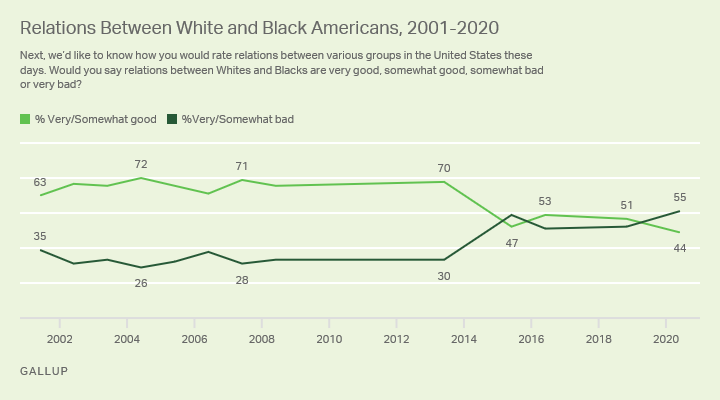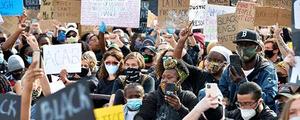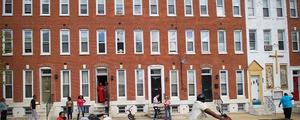Story Highlights
- Fewer than half rate relations between White and Black Americans "good"
- Current 44% is lowest in 20-year trend
- Both racial groups still hopeful problems will eventually be resolved
WASHINGTON, D.C. -- Americans' already tepid review of relations between White and Black Americans has soured since 2018 and is now the most negative of any year in Gallup's trend since 2001. The majority of U.S. adults say relations between White and Black Americans are very (24%) or somewhat bad (31%), while less than half call them very (7%) or somewhat (37%) good.

Line graph. Trend from 2001 to 2020 in Americans ratings of relations between White and Black adults in the U.S. The percentage rating relations good was 63% in 2001. It peaked at 72% in 2004 and remained high through 2013, before falling to 47% in 2015. Since then, the percentage rating relations good has been under 50%, including 44% in the latest reading, from 2020.
Most Americans were upbeat about White-Black relations from 2001 through 2013, with the percentage calling them good to any degree ranging from 63% to 72%. The sharp decline in positive perceptions to 47% in 2015 followed numerous high-profile incidents in the prior year of unarmed Black citizens being killed by White police officers.
After improving slightly in 2016 and 2018, ratings of race relations have fallen to a new low in a Gallup telephone poll conducted June 8-July 24, 2020. The nationally representative survey of 1,226 U.S. adults includes an oversample of Black Americans weighted to their correct proportion of the population.
The latest poll was taken after the start of widespread protests on racial justice sparked by the death of George Floyd in Minneapolis in May, but before the recent shooting of Jacob Blake in Kenosha, Wisconsin, and political conflict in Portland, Oregon, that have led to deaths among protestors and counterprotestors.
Ratings at Low Ebb Among Both Racial Groups
Through most of Gallup's trend, White Americans have been more likely than Black Americans to rate White-Black relations positively. But until 2015, large majorities of both groups thought relations were generally good; since then, positive ratings from White and Black Americans have been more subdued.
Positive ratings of White-Black relations have deteriorated slightly more in the past 18 months among White Americans (down eight percentage points to 46%) than among Black Americans (down four points to 36%). The figure among White Americans roughly matches the prior low of 45% recorded in 2015, while Black Americans' perceptions are the lowest yet.

Line graph. Trend from 2001 to 2020 in White and Black Americans ratings of White-Black relations. Since July 2013, the percentage rating relations very or somewhat good has fallen from 66% to 36% among Black Americans and from 72% to 46% among White Americans.
Other Group Relations Rated More Positively
The survey also asked Americans to rate relations between other racial and ethnic groups. Of the five different pairings explored, White-Black relations are viewed as the most troubled this year.
The 44% of Americans perceiving relations between White and Black Americans to be very or somewhat good contrasts with 78% for White-Asian relations, 68% for Black-Asian relations, 66% for Black-Hispanic relations, and 62% for White-Hispanic relations.
White-Black relations were not the only pairing to show a decline in 2020 compared with the average from 2015 to 2018. Similar drops are seen in positive ratings for White-Asian relations (down seven points) and White-Hispanic relations (down four points). At the same time, there have been no meaningful changes in ratings of Black-Asian or Black-Hispanic relations.
| 2001-2013 | 2015-2018 | 2020 | |||||||||||||||||||||||||||||||||||||||||||||||||||||||||||||||||||||||||||||||||||||||||||||||||
|---|---|---|---|---|---|---|---|---|---|---|---|---|---|---|---|---|---|---|---|---|---|---|---|---|---|---|---|---|---|---|---|---|---|---|---|---|---|---|---|---|---|---|---|---|---|---|---|---|---|---|---|---|---|---|---|---|---|---|---|---|---|---|---|---|---|---|---|---|---|---|---|---|---|---|---|---|---|---|---|---|---|---|---|---|---|---|---|---|---|---|---|---|---|---|---|---|---|---|---|
| % | % | % | |||||||||||||||||||||||||||||||||||||||||||||||||||||||||||||||||||||||||||||||||||||||||||||||||
| Whites and Asians | 81 | 85 | 78 | ||||||||||||||||||||||||||||||||||||||||||||||||||||||||||||||||||||||||||||||||||||||||||||||||
| Blacks and Asians^ | -- | 66 | 68 | ||||||||||||||||||||||||||||||||||||||||||||||||||||||||||||||||||||||||||||||||||||||||||||||||
| Blacks and Hispanics | 54 | 63 | 66 | ||||||||||||||||||||||||||||||||||||||||||||||||||||||||||||||||||||||||||||||||||||||||||||||||
| Whites and Hispanics | 68 | 66 | 62 | ||||||||||||||||||||||||||||||||||||||||||||||||||||||||||||||||||||||||||||||||||||||||||||||||
| Whites and Blacks | 68 | 50 | 44 | ||||||||||||||||||||||||||||||||||||||||||||||||||||||||||||||||||||||||||||||||||||||||||||||||
| ^ Relations between Blacks and Asians not rated before 2015 | |||||||||||||||||||||||||||||||||||||||||||||||||||||||||||||||||||||||||||||||||||||||||||||||||||
| Gallup | |||||||||||||||||||||||||||||||||||||||||||||||||||||||||||||||||||||||||||||||||||||||||||||||||||
Although White-Black relations are rated significantly worse now than other intergroup pairings, this has not always been the case. On average, between 2001 and 2013, White-Black relations were rated similarly to White-Hispanic relations and better than Black-Hispanic relations. That changed in 2015 as nationwide protests brought greater attention to racial disparities in the use of lethal force by police.
Throughout Gallup's measurement of racial/ethnic group relations since 2001, ratings of relations between White and Asian Americans have been rated best, with more than three-quarters of the public consistently calling them good.
Americans Remain Optimistic That White-Black Relations Will Improve
The public's brighter outlook for relations between Black and White Americans has shown little change since it was last measured. The majority continues to be optimistic that a solution will eventually be worked out, with 59% saying so this year, compared with 57% in late 2018.
Optimism about the future of relations between the two racial groups was below 50% in the mid- to late 1990s, spanning the Rodney King riots and O.J. Simpson case. Since then, at least half have been optimistic about a solution being worked out, including a brief rise to 67% in November 2008, the day after Barack Obama became the first Black American to be elected president.

Line graph. Trend from 1963 to 2020 in percentage of Americans who think a solution to relations between Black and White Americans in the United States will eventually be worked out. This was 55% in 1963 but has since varied from low points of 29% and 41% in the 1990s to a high of 67% in 2008 just after Barack Obama was elected. More typically it has been near 55%, and today it is 59%.
The trend in White Americans' outlook for White-Black relations has also been fairly stable. Sixty percent today are optimistic a solution will be worked out vs. 59% in 2018.
At the same time, Black Americans' optimism is up 10 points to 54%, edging out the 50% positive after Obama clinched the Democratic nomination in June 2008. Black Americans' optimism may have been even higher after the November election that year, but Gallup's post-election survey did not have a sufficient number of Black respondents to report their views.
Longer-term, Black Americans' optimism was significantly higher (70%) in 1963, which is widely considered the "defining year" of the Civil Rights Movement.

Line graph. Trend from 1964 to 2020 in White and Black Americans views on the outlook for race relations. In 1963, Black Americans were much more optimistic than White Americans that a solution to racial problems would eventually be worked out. The two groups had similar views in the 1990s, when both were fairly pessimistic. Since then, White Americans have been more optimistic than Black Americans, including by a six-percentage-point margin today of 60% to 54%.
Bottom Line
There is no right or perfect way to say objectively whether relations between large subgroups of the American population are healthy or frayed. But polls can measure different aspects of such relations, including the extent to which racial groups interact in various settings and how each group feels about those experiences.
When it comes to White-Black relations, one such indicator involves Black Americans' reports of feeling they have been unfairly treated in each of several public situations -- in stores, at work, in dealings with the police, and so on. Gallup's recent finding that nearly half of Black Americans felt unfairly treated in at least one setting in the past month suggests relations are far from perfect.
Another indicator of the health of race relations is how Americans themselves assess those relations when asked directly. On that basis, Gallup finds that even before the situation in Kenosha erupted, White-Black relations were at a two-decade low, with Black Americans even less positive than White Americans. This contrasts with Americans' more positive reviews of the state of relations between other racial/ethnic groups.
One encouraging sign in all of this is that for more than a decade, majorities of Black and White Americans have remained generally optimistic that the future holds the promise of a solution to today's problems.
View complete question responses and trends (PDF download).
Learn more about how the Gallup Poll Social Series works.




